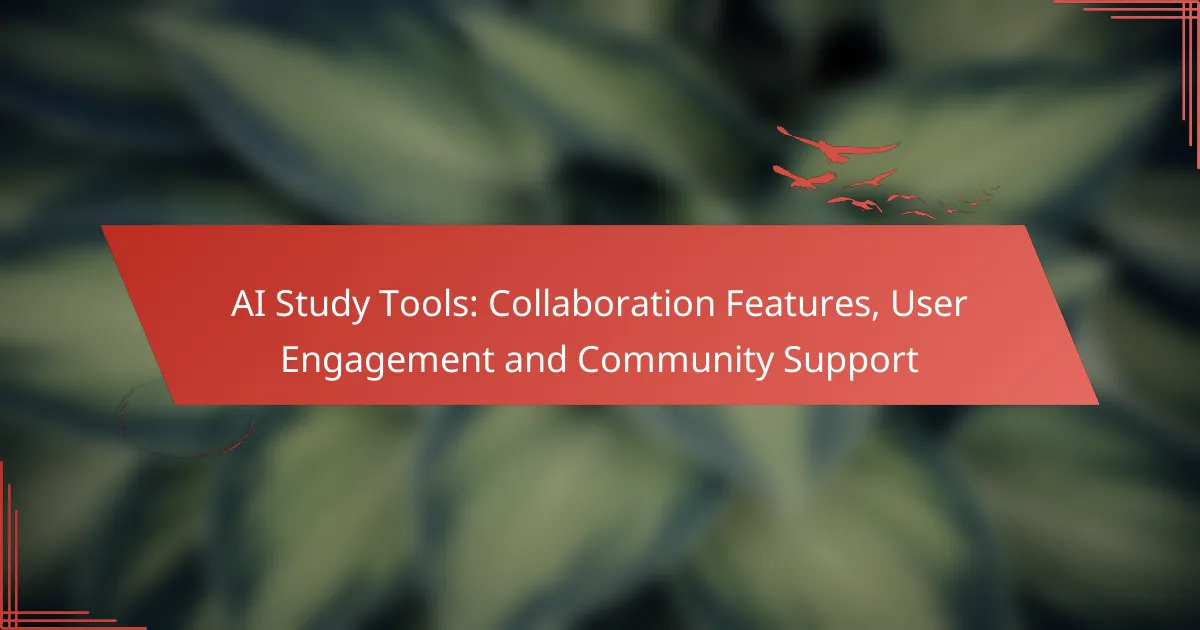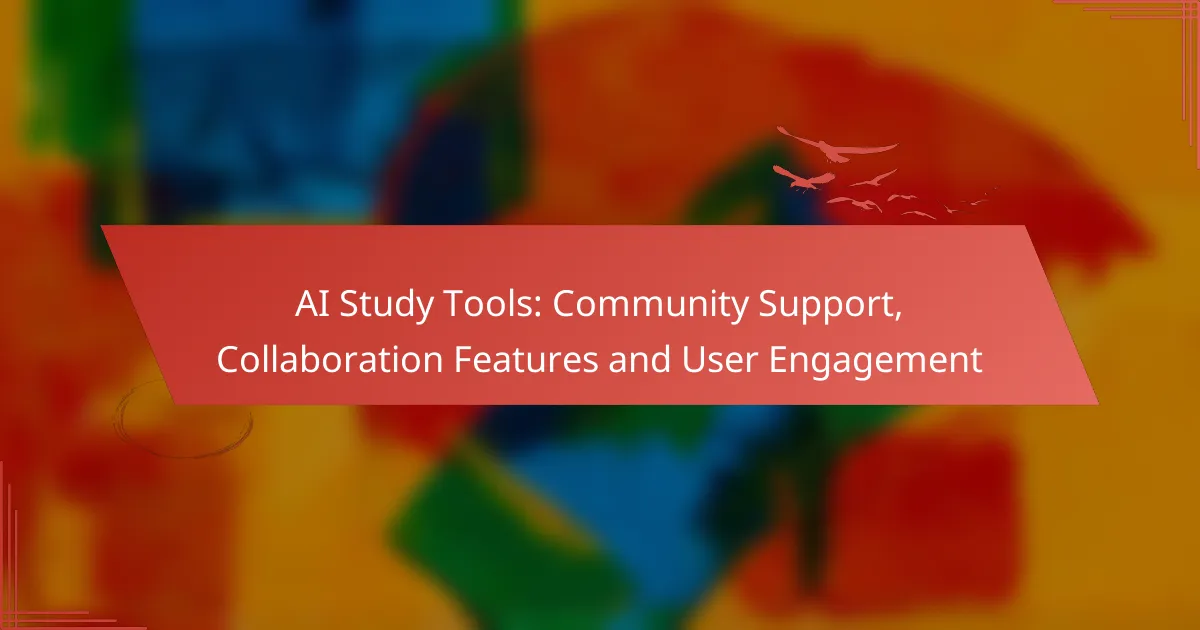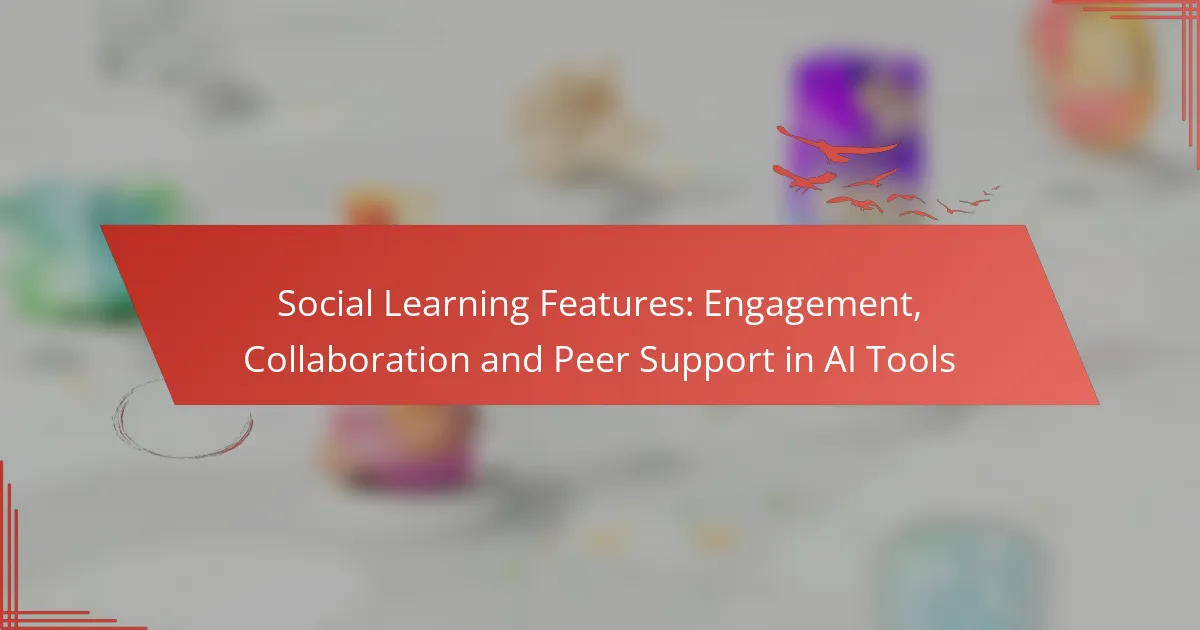AI study tools are revolutionizing group learning by offering collaboration features that enable real-time communication and shared resources. These platforms not only enhance user engagement through interactive and personalized experiences but also provide robust community support, including forums and peer groups, to facilitate collaboration and foster a sense of belonging among learners.

What Are the Best AI Study Tools for Collaboration?
The best AI study tools for collaboration enhance group learning through shared resources, real-time communication, and integrated workflows. These platforms facilitate teamwork, making it easier for users to engage with each other and access study materials efficiently.
Notion
Notion is a versatile tool that combines note-taking, task management, and database functionalities, making it ideal for collaborative study. Users can create shared workspaces where they can organize notes, documents, and tasks in a visually appealing manner.
Key features include real-time editing, comments, and the ability to embed various media types. This allows study groups to centralize information and collaborate effectively, ensuring everyone stays on the same page.
Microsoft Teams
Microsoft Teams is a robust platform designed for communication and collaboration, particularly in educational settings. It integrates chat, video conferencing, and file sharing, allowing study groups to connect seamlessly.
With features like channels for specific topics and the ability to schedule meetings, Teams helps organize group study sessions. Additionally, integration with other Microsoft Office tools enhances productivity by allowing users to work on documents together in real-time.
Google Workspace
Google Workspace provides a suite of tools that support collaboration through Google Docs, Sheets, and Slides. These applications allow multiple users to edit documents simultaneously, making it easy to work together on projects or study materials.
Google Drive serves as a central repository for all files, enabling easy sharing and access. The commenting and suggestion features facilitate feedback and discussion, which are crucial for effective group study.

How Do AI Study Tools Enhance User Engagement?
AI study tools enhance user engagement by providing interactive and personalized learning experiences. These tools leverage technology to create dynamic environments that motivate users and facilitate collaboration.
Interactive Learning Features
Interactive learning features in AI study tools encourage active participation, making the learning process more engaging. Examples include quizzes, simulations, and discussion forums that allow users to apply concepts in real-time.
These features often incorporate multimedia elements, such as videos and interactive diagrams, which cater to different learning styles. By engaging users through various formats, these tools can significantly improve retention and understanding of the material.
Gamification Elements
Gamification elements, such as points, badges, and leaderboards, add a competitive edge to the learning experience. By integrating these elements, AI study tools motivate users to complete tasks and achieve learning milestones.
For instance, a user might earn points for completing exercises or receive badges for mastering specific topics. This not only enhances motivation but also fosters a sense of community among learners who can share their achievements.
Real-time Feedback Mechanisms
Real-time feedback mechanisms provide immediate insights into user performance, helping learners identify strengths and areas for improvement. These tools often utilize algorithms to analyze responses and offer tailored suggestions for further study.
For example, if a user struggles with a particular concept, the tool may recommend additional resources or practice questions. This instant feedback loop keeps users engaged and encourages continuous learning, making the study process more effective.

What Community Support Options Are Available?
Community support options for AI study tools typically include online forums, peer collaboration groups, and expert Q&A sessions. These resources foster engagement and provide users with valuable assistance and insights from fellow learners and experts.
Online Forums
Online forums serve as virtual meeting places where users can discuss topics related to AI study tools. Participants can ask questions, share experiences, and exchange resources, creating a collaborative environment. Popular platforms include Reddit and specialized forums dedicated to AI education.
When engaging in online forums, it’s crucial to follow community guidelines and respect differing opinions. Regular participation can enhance your learning experience and help you build a network of like-minded individuals.
Peer Collaboration Groups
Peer collaboration groups are small teams of learners who come together to study and support each other. These groups can be formed through educational platforms or social media, allowing members to share knowledge and tackle challenging concepts collectively.
To maximize the benefits of peer collaboration, establish clear goals and schedules for meetings. Consider using tools like Google Meet or Zoom for virtual discussions, and platforms like Slack or Discord for ongoing communication.
Expert Q&A Sessions
Expert Q&A sessions provide opportunities to interact with knowledgeable professionals in the AI field. These sessions can be hosted online or in-person, allowing participants to ask specific questions and gain insights from experienced practitioners.
To make the most of these sessions, prepare questions in advance and actively participate in discussions. Look for events hosted by educational institutions or industry conferences, as they often feature renowned experts willing to share their expertise.

What Criteria Should You Consider When Choosing AI Study Tools?
When selecting AI study tools, focus on features that enhance collaboration, user engagement, and community support. These elements significantly impact the effectiveness of the learning experience and the ability to work with peers.
Collaboration Features
Collaboration features are essential for fostering teamwork and enhancing learning outcomes. Look for tools that offer real-time editing, shared workspaces, and communication channels such as chat or video conferencing. These functionalities allow students to work together seamlessly, regardless of their physical location.
Consider tools that integrate with popular platforms like Google Workspace or Microsoft Teams, as this can streamline collaboration. Additionally, features like version history and comment threads can help track changes and facilitate discussions among users.
User Interface Design
A user-friendly interface is crucial for maintaining engagement and ensuring that users can navigate the tool easily. Prioritize tools with intuitive layouts, clear navigation menus, and responsive design that works well on both desktop and mobile devices. A clean, organized interface reduces cognitive load and allows users to focus on their studies.
Pay attention to customization options as well; tools that allow users to personalize their dashboards or study environments can enhance motivation and usability. Look for feedback from current users regarding their experiences with the interface to gauge effectiveness.
Integration Capabilities
Integration capabilities determine how well an AI study tool can connect with other software and platforms you already use. Choose tools that can easily integrate with learning management systems (LMS), productivity apps, and data storage solutions. This compatibility can streamline workflows and enhance the overall learning experience.
Evaluate the APIs and third-party integrations available for each tool. A robust integration ecosystem can save time and reduce the need for manual data entry, allowing users to focus on studying rather than managing multiple platforms.

How Do Subscription Models Affect AI Study Tool Access?
Subscription models significantly influence access to AI study tools by determining the features available and the overall cost. Users must consider their needs and budget when selecting a plan, as different models offer varying levels of functionality and support.
Monthly vs Annual Plans
Monthly plans provide flexibility, allowing users to pay for only what they need on a short-term basis. However, they often come at a higher monthly rate compared to annual plans, which typically offer a discount for committing to a longer subscription period. For example, an annual plan might cost around 20-30% less than paying monthly over the same time frame.
When choosing between these options, consider your usage frequency. If you plan to use the tool consistently throughout the year, an annual plan can be more economical. Conversely, if your needs are sporadic, a monthly plan may be more suitable.
Free Trials and Discounts
Many AI study tools offer free trials, allowing users to explore features before committing to a subscription. These trials usually last from a week to a month, providing ample time to assess the tool’s effectiveness. Look for promotional discounts that may be available during the trial period, which can further reduce costs.
Be cautious of automatic renewals at the end of a trial. Always check the terms to avoid unexpected charges. Some platforms also provide discounts for students or educational institutions, making them more accessible.
Feature Limitations by Tier
Subscription tiers often come with feature limitations, impacting user experience and functionality. Basic plans may restrict access to advanced tools, collaboration features, or community support, while premium tiers typically offer full access to all features. For instance, a basic plan might limit the number of study sessions or available resources.
When selecting a tier, evaluate which features are essential for your study needs. If collaboration with peers or access to extensive resources is crucial, investing in a higher tier may be worthwhile. Always review the comparison charts provided by the service to understand what each tier includes and any potential trade-offs.

What Are the Emerging Trends in AI Study Tools?
Emerging trends in AI study tools focus on enhancing user experience through advanced personalization, intelligent tutoring systems, and robust community support. These innovations aim to improve engagement and collaboration among learners, making study processes more efficient and tailored to individual needs.
Increased Personalization
Increased personalization in AI study tools allows for customized learning experiences based on individual user preferences and performance data. By analyzing a learner’s strengths and weaknesses, these tools can adapt content and study paths to better suit their unique needs.
For example, a student struggling with math concepts may receive targeted exercises and resources, while another excelling in the same subject might be offered advanced challenges. This tailored approach can significantly enhance motivation and retention of information.
AI-Powered Tutoring
AI-powered tutoring systems provide real-time assistance and feedback, simulating the experience of having a personal tutor. These systems can analyze user interactions and adapt their teaching methods accordingly, offering explanations and practice problems that align with the learner’s pace.
Many AI tutoring platforms utilize natural language processing to understand student questions and provide relevant answers. This capability allows for a more interactive and engaging learning environment, where students can receive help at any time without the constraints of traditional tutoring schedules.



